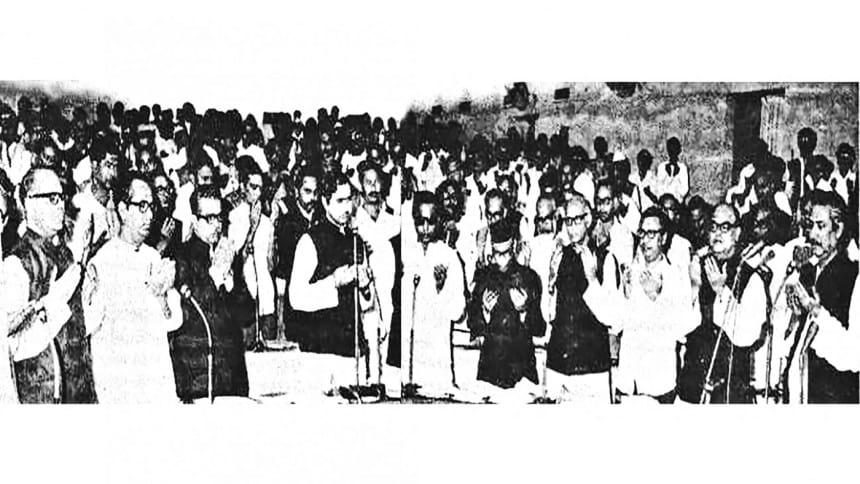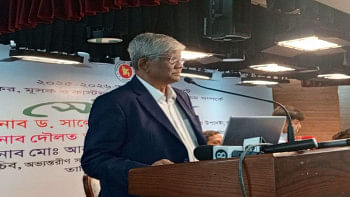The voices of dissent in the Constituent Assembly of Bangladesh: Sengupta, Larma and Chowdhury

Of all the members of the Constituent Assembly of Bangladesh, Suranjit Sengupta, Manabendra Narayan Larma, and Mohammad Abdul Aziz Chowdhury deserve a special mention for their distinguished role in the making of the Constitution. All three of them expressed dissenting opinions on the Constitution Bill, which was ultimately adopted as the Constitution of Bangladesh on November 4, 1972. Suranjit Sengupta was elected from the Sylhet-2 constituency as a candidate of the National Awami Party (NAP). Besides, Suranjit Sengupta served as a member of the Constitution Drafting Committee. Manabendra Narayan Larma and Mohammad Abdul Aziz Chowdhury represented Chittagong Hill Tracts-1 and Sylhet-21 constituencies, respectively. This essay will curate their respective thoughts and arguments albeit briefly in the Constituent Assembly of Bangladesh.
On April 11, 1972, the Constitution Drafting Committee was formed comprising 34 members in order to draft a Constitution Bill for the consideration of the Constituent Assembly. A total of six members recorded dissents on several aspects of the Constitution Bill before the Committee. They are, AK Mosharraf Hossain Akand, Asaduzzaman Khan, Abdul Muntaquim Chaudhury, Hafez Habibur Rahman, Khitish Chandra Mondal, and Suranjit Sengupta. On October 12, 1972, Dr Kamal Hossain, the then Law Minister and Chairman of the Constitution Drafting Committee put forward the Constitution Bill before the Constituent Assembly. Interestingly, none of the aforesaid members, except Suranjit Sengupta, was later found to espouse any dissenting opinion on the Constitution Bill before the Constituent Assembly.
Suranjit Sengupta's role as a dissenter for the first time transpired before the Constituent Assembly on October 19, 1972 when Dr Kamal Hossain proposed that the Assembly should accept the Constitution Bill for deliberation. Opposing Dr Kamal Hossain's proposal, he proposed that the Constitution Bill be disseminated for assessment of public opinion. Later, on October 24, 1972, Suranjit Sengupta in a lengthy address to the Constituent Assembly critiqued the Constitution Bill during the general debates phase. In short, he criticised, among others, the Constitution Bill for imposing reasonable restrictions on the enjoyment of fundamental rights, non-justiciability of the fundamental principles of state policy, the prime minister's power to dissolve the parliament, Article 70, ambiguity in the provision concerning the acquisition of property, modes of ownership of property, the lack of parliament's power to approve ratification treaties, the number of the seats of the parliament, provisions related to public service, etc. Furthermore, he staunchly advocated for the incorporation of provisions in the Constitution Bill providing for the ceiling of private property and the limits of free and compulsory education. Suranjit Sengupta opined that the Constitution Bill vested enormous power in the hands of the prime minister, which was not wholesome for a democratic system of government.
Suranjit Sengupta also played a very active role during the clause-by-clause consideration of the Constitution Bill. He alone introduced the highest number of amendment proposals to the Constitution Bill. It appears from the proceedings of the Constituent Assembly that Suranjit Sengupta brought amendments even to those provisions of the Constitution Bill which he previously supported before the Constitution Drafting Committee.
Manabendra Narayan Larma addressed the Constituent Assembly on the Constitution Bill on October 25, 1972. Earlier, on October 19, 1972, he joined with Suranjit Sengupta in support of the proposal for dissemination of the Constitution Bill for assessment of public opinion. One of his main points of contention was the Constitution Bill, despite Bangladesh being a multination state, mentioned no other ethnic communities except the Bengalis, and it lacked any separate administrative arrangement for the Chittagong Hill Tracts region. During the clause-by-clause consideration of the Constitution Bill, Manabendra Narayan Larma expressed strong objection to an amendment to Article 6 proposed by Abdur Razzak Bhuiyan (N.E.-115, Dhaka-12), which provided that the people of Bangladesh should be known as "Bangalees." Conversely, he proposed that the citizens of Bangladesh should be known as "Bangladeshies." When the said amendment was adopted by the Constituent Assembly, Larma walked out in protest.
Manabendra Narayan Larma demanded autonomy for the Chittagong Hill Tracts region like it had enjoyed a special status during the British and Pakistani eras. Much like Suranjit Sengupta, he thought that neither democracy nor socialism was properly reflected in the Constitution Bill. In particular, he thought that the incorporation of provisions in the Constitution Bill recognising cooperative and private ownership alongside state ownership as regards the instruments and means of production would not be conducive to socialism. Above all, both Suranjit Sengupta and Manabendra Narayan Larma were of the opinion that the Constitution Bill contained the shadow of the 1956 and the 1962 Constitutions of Pakistan.
Mohammad Abdul Aziz Chowdhury addressed the Constituent Assembly on October 30, 1972. He was critical of the Constitution Bill for permitting the government to impose reasonable restrictions on the enjoyment of fundamental rights of the people. In addition, he vehemently criticised the provisions relating to the prime minister's power to dissolve the parliament i.e., Article 57 and the vacation of the seat of any member of parliament on the grounds of expulsion from the political party i.e., Article 70. About Article 57, he argued that the prime minister's single-handed power to dissolve the parliament could result in a one-man rule situation in the country and thus become a stumbling block for the flourishment of democracy. He disapproved of Article 70 for the reason that no person was elected solely on the basis of party support and the candidate's personal qualities and competence also had an important role to play. Hence, the vacation of the seat of any member of parliament on the grounds of expulsion from the political party, in his opinion, would curtail the right of the electorate of the constituency concerned. Mohammad Abdul Aziz Chowdhury categorically expressed that the Constitution Bill would not be acceptable to the people at large.
In the closing speech on October 30, 1972 during the general debates phase, Dr Kamal Hossain addressed the aforesaid criticisms of Suranjit Sengupta, Manabendra Narayan Larma and Mohammad Abdul Aziz Chowdhury to some extent.
Referring to the constitutions of several socialist and democratic states, Dr Kamal Hossain explained that in none of these countries fundamental rights had been guaranteed without reasonable restrictions imposed by law. He argued that on the one hand, it was a question of civil rights, but on the other hand, public welfare and public interest should not be overlooked, and a balance should be struck between them. About the non-justiciability of fundamental principles of state policy, he took the position that the materialisation of these principles required planning, finance, infrastructure, etc, and therefore, the court was not the suitable forum to actualise them. Regarding the criticism about the prime minister's power to dissolve the parliament, Dr Kamal Hossain pointed out that the constitutions of most of the parliamentary democracies including Britain had accepted the same system. On the question of education, he maintained that the limits of free and compulsory education should be determined by the educationists who would frame the education policy of the country.
In his reply to Manabendra Narayan Larma's contention, Dr Kamal Hossain stated that the dwellers of Chittagong hill tracts were made lower-class citizens during the British and the Pakistani eras. On the other hand, the Constitution Bill accorded equal status to all citizens of the country and it would be the responsibility of the state to emancipate the backward sections of the society from exploitation. Dr Kamal Hossain asked Manabendra Narayan Larma to forget the colonial past and move forward. On the similarity between the Constitution Bill of Bangladesh and the 1956 and the 1962 Constitutions of Pakistan, Dr Kamal observed that although there were some linguistic similarities, many fundamental changes were introduced in the Constitution Bill. He observed that despite the presence of several good provisions in the aforesaid Constitutions of Pakistan, no benefit accrued to the people because there was no democracy in Pakistan.
As may be discerned, for the dissenting voices of Suranjit Sengupta, Manabendra Narayan Larma and Mohammad Abdul Aziz Chowdhury, the deliberation in the Constituent Assembly turned into a lively debate in the true sense. Such as, when Bangabandhu Sheikh Mujibur Rahman requested Suranjit Sengupta to withdraw his proposal for assessment of public opinion on the Constitution Bill, he remained steadfast in his position. Eventually, his proposal was put to vote and rejected by the Assembly members. On another occasion, during the general debates phase in the Constituent Assembly, Suranjit Sengupta referred to Bangabandhu as coming from a lower-middle-class family. When faced with criticism for this remark, Suranjit Sengupta stated that despite Bangabandhu's high stature as the father of the nation before the Assembly, the opposition would always have the right to hold him accountable as the prime minister of the country.
Lastly, it should be mentioned that the Constituent Assembly showed a respectful and accommodating attitude toward the dissenting voices. When Suranjit Sengupta was once interrupted by some members during his speech in the Constituent Assembly, Syed Nazrul Islam, the Deputy Leader of the Assembly requested the speaker to make sure that Suranjit Sengupta could freely express his opinion. When Manabendra Narayan Larma complained about interruption during his speech on the Constitution Bill, the Speaker intervened in his favour.
Even after five decades of the adoption of the Bangladesh Constitution, the value of many of the critiques and criticisms of the Constitution Bill remains pertinent. A few of them have already been embraced, maybe not with open arms though. Others might be appreciated sooner or later as we will move towards building a more democratic society. No doubt, Suranjit Sengupta, Manabendra Narayan Larma and Mohammad Abdul Aziz Chowdhury will be remembered not only for their profound wisdom and insight, but also for their undaunting endeavours in the making of the Constitution of Bangladesh.
Kawser Ahmed is Advocate, Supreme Court of Bangladesh and Adjunct Associate Professor, Eastern University, Dhaka.

 For all latest news, follow The Daily Star's Google News channel.
For all latest news, follow The Daily Star's Google News channel. 



Comments